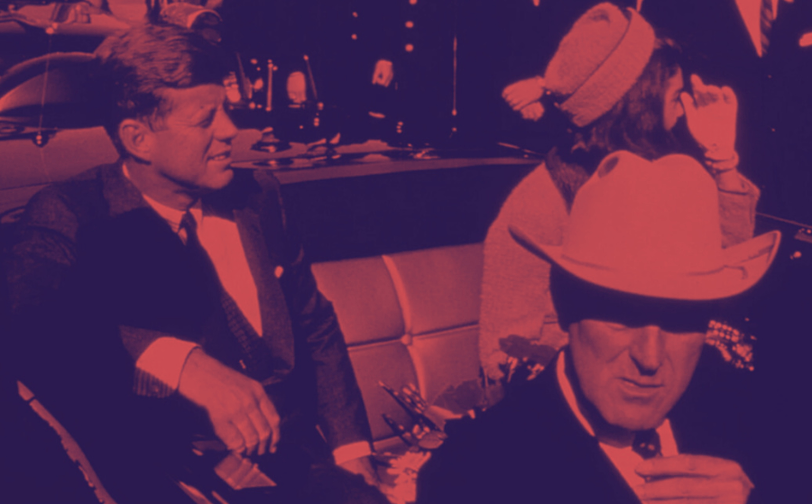Declassified JFK Files: Trump's orders declassification of JFK & MLK assassination files
President Trump’s recent order to begin declassifying documents related to the JFK, RFK, and MLK assassinations marks a pivotal moment in the ongoing quest for truth about some of the most tragic events in U.S. history. Though the process is still in its early stages, the move has reignited public interest in these iconic figures and their untimely deaths. The release of these documents could reveal new information, but it could also complicate existing theories and leave many questions unanswered. As experts and the public eagerly await the outcome, one thing is certain: the mysteries surrounding these assassinations are far from over, and the search for answers continues to shape America’s national narrative.
GEO-POLITICSUSA


Declassified JFK Files: Trump Orders Plan for Release of Classified JFK and MLK Assassination Files
The American public has been waiting for decades for the truth about the assassinations of some of the most iconic figures in modern history: John F. Kennedy, Robert F. Kennedy, and Martin Luther King Jr. Now, in a groundbreaking move, President Donald Trump has ordered the release of documents related to these tragic events. This move comes after years of speculation, conspiracy theories, and a growing public demand for more transparency.
In a recent press briefing at the White House, Trump expressed that “a lot of people are waiting for this… for years, for decades,” implying the deep public curiosity surrounding these files. The order mandates that officials present a plan to declassify these documents within 15 days. While this order marks a significant step forward, it doesn’t guarantee that the documents will be fully released—just that plans for their declassification will begin.
A History of Mystery and Speculation
The deaths of JFK, RFK, and MLK are some of the most consequential events in American history, and each has its own set of unresolved questions. JFK’s assassination in Dallas on November 22, 1963, was the spark for countless conspiracy theories, with many Americans refusing to believe that Lee Harvey Oswald was the lone gunman. Despite the Warren Commission's conclusions, doubts about Oswald's role—and the possibility of broader plots involving the CIA, mafia, and even foreign governments—have persisted for decades.
In the years following JFK’s death, millions of documents were sealed under national security claims, and while some documents have been declassified over the years, large sections remain inaccessible to the public. This is despite the passage of the JFK Assassination Records Collection Act of 1992, which mandated the release of all documents related to the assassination. While both Presidents Trump and Biden have released large batches of documents, thousands are still hidden behind redactions.
JFK assassination expert Jefferson Morley, editor of JFK Facts, remarked that “as a statement of intention, it’s great that the president has put his promise into words. But the details and implementation are everything.” Indeed, even as the wheels of declassification start turning, the public’s hopes remain mixed—will the documents reveal the truth, or will they only add to the layers of mystery?
New Revelations and Lingering Questions
Even as the push for declassification gains momentum, recent years have seen new developments that cast further doubt on the official narrative of JFK’s assassination. One such revelation came in 2023 from Paul Landis, an 88-year-old former Secret Service agent who was an eyewitness to the event. Landis’s account involves retrieving a bullet from the car after JFK was shot, which he later placed on the president’s stretcher at the hospital.
This seemingly minor detail could have huge implications for the official story. The Warren Commission concluded that a single bullet fired by Oswald caused injuries to both President Kennedy and Texas Governor John Connally—a theory that has long been dismissed by skeptics as the “magic bullet theory.” Landis’s revelation raises serious questions about whether the two men were struck by the same bullet, suggesting that perhaps the official account is flawed.
Experts like historian James Robenalt have called Landis’s disclosure “the most significant news in the assassination since 1963,” but not everyone is convinced. Some of Landis’s colleagues, including fellow Secret Service agent Clint Hill, have expressed doubts about his version of events, with Hill going as far as to say it “doesn’t make any sense” and questioning the accuracy of Landis’s memory after so many years.
Despite these varying opinions, one thing is clear: the mysteries surrounding JFK’s death are far from resolved. If anything, the new information only deepens the public’s fascination with what really happened on that fateful day in Dallas.
The Tragedy of RFK and MLK
While JFK’s assassination has garnered the most attention, the deaths of his brother, Robert F. Kennedy, and civil rights leader Martin Luther King Jr. add layers of complexity to this historical web. RFK’s assassination in 1968, while he was running for president, was carried out by Sirhan Sirhan, a Palestinian man angry over RFK’s stance on Israel. But many—including RFK’s son, Robert F. Kennedy Jr.—have questioned whether Sirhan acted alone, suggesting there might have been others involved in the plot to kill the senator.
Similarly, MLK’s assassination in Memphis in 1968, which was blamed on James Earl Ray, has been clouded by doubts from King’s family members. They allege that Ray was part of a broader conspiracy to silence the civil rights leader, and the government’s handling of the case has raised suspicions that vital evidence may have been ignored or covered up.
By including RFK and MLK in the declassification order, Trump’s administration is acknowledging that these figures—along with JFK—are still central to the American psyche. The release of documents related to their deaths could shed light on a history that, for many, remains incomplete and shrouded in secrecy.
The Ongoing Fascination with JFK's Death
The assassination of JFK continues to captivate the American public, fueled by documentaries, books, movies, and, of course, conspiracy theories. As the 60th anniversary of JFK’s death approaches in 2023, the fascination with his life and tragic end shows no signs of fading. Scholars like Peter Ling, who has spent years studying JFK’s impact, note that his death represents the beginning of the end for the idealistic vision of the 1960s. "The Kennedy assassination becomes seen as this moment when the hopefulness of the 60s starts to falter," Ling said.
This sense of national loss and the inability to fully explain what happened that day is why the topic remains so deeply ingrained in the collective American memory. Whether through the Zapruder film, documentaries like Oliver Stone’s JFK, or the millions of books written on the subject, the mystery surrounding JFK’s assassination remains a cultural touchstone.
And, as the latest revelations suggest, this is a mystery that shows no signs of being solved anytime soon. The new documents, once declassified, may provide a clearer picture, but they may also raise new questions that send the public searching for even more answers.
What Happens Next?
The question of how the Trump administration will implement this declassification remains an open one. The timeline is set—officials have 15 days to present a plan—but the contents of the documents themselves are still under review. There’s no guarantee that they will reveal the “smoking gun” many are hoping for, and as Morley warned, the process could end up being far more complicated than the public anticipates.
Still, the significance of this moment cannot be overstated. These are the documents that could offer a glimpse into the truth behind one of America’s most pivotal moments. They might not give a definitive answer to the questions about who was behind the murders of JFK, RFK, and MLK, but they have the potential to uncover new details and offer a better understanding of what really happened.
As historian Gerald Posner, who authored Case Closed on the JFK assassination, put it: "Are you going solve it to anybody’s 100% satisfaction? No. It’s a case that will never be closed, for most people." But even if the truth remains elusive, the push for declassification is a reminder that the search for answers, no matter how long it takes, is always worth it.
